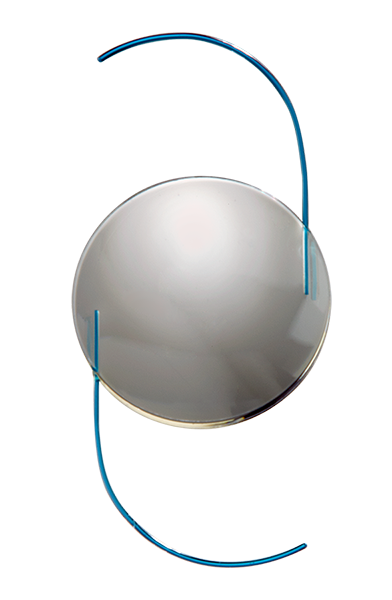Cataracts are a condition, not a disease that results when the natural lens of the eye becomes cloudy. Unlike what many think, it is not a growth of skin or film over the eye. The position and density of the cloudy area in the lens determines the amount of vision impaired and the varying effects on the quality of vision. Cataracts often make vision blurry, seem out of focus, or create halos around lights. In particular, cataracts can make seeing at night very difficult.


Most cataracts form as a normal part of the natural aging process and are present in half of adults over age 65. Other causes of cataracts include trauma, certain drugs or diseases such as diabetes. To a lesser degree, some babies are born with cataracts or develop them soon after birth, but this is rare.
The natural crystalline lens in the eye is made mostly of water and protein. A cataract is when some of this protein clumps together, causing the natural lens in the eye to become discolored and cloudy.
Eventually everyone will develop cataracts, unless they already have had Clear Lens Replacement in the past.
The development of cataracts is usually a very slow process. In its early stages, eyeglasses and contact lenses are effective in relieving visual issues, however, as time goes on and the cataract worsens, the only way of restoring vision is with cataract surgery. Cataract surgery involves removing the cloudy natural lens in the eye and replacing it with a new artificial lens, called an Intraocular Lens Implant or IOL.
Cataracts can create symptoms including:






The only way to treat a cataract is to remove the cloudy lens (called a cataract) and replace it with a clear artificial Intraocular Lens Implants (called an IOL). Restoration of vision is accomplished every day through the miracle of cataract surgery. In fact, cataract surgery is one of the most often performed surgeries today. It is considered to be one of the safest and most successful surgeries performed in the US.
Using the advanced technology of the Centurion® Vision System and Alcon LenSx Laser, we are able to safely and gently remove the cataract. The surgery is performed on an outpatient basis and under local anesthesia. The actual surgery takes less than 20 minutes, although you will be here longer for pre-op and post-op care. You usually see a doctor the next day after surgery just to make sure that all is well.

The Eye Associates is excited to provide computer-guided laser cataract surgery utilizing Alcon’s LenSx® laser. This groundbreaking laser elevates cataract surgery to new heights with its unmatched precision and personalization. The cutting-edge technology integrates computer control into critical steps of the procedure, allowing cataract patients to have the most sophisticated surgical option available.

Stitchless cataract surgery promotes swift recovery with lessened discomfort and improved vision without the requirement for stitches. By making a tiny incision at the edge of the cornea, our cataract surgeons can extract the cataract and position the IOL without the need for stitches. The area will naturally heal and close, reducing discomfort and irritation that can occasionally result from stitches.

With the use of topical anesthetics, you can now experience cataract surgery without the need for needles. This technique eliminates the discomfort and anxiety commonly linked to needles.

If you think you might need cataract surgery, the first step is to have a comprehensive eye examination. Your doctor will be able to determine if a cataract is the cause of your decreased vision. If it is, and if it is inhibiting your quality of life and the activities that bring you joy, then our surgeons can help you determine which cataract surgery option is best for your eyes and lifestyle.

Most patients have two choices when it comes to lens implants: standard lens implants or high-tech lens implants. Your cataract surgeon will make a recommendation based on your vision goals and the current anatomy and health of your eyes. However, ultimately, the decision will be up to you. Some of the advanced IOL options we offer include:
Medicare and many health insurance plans partially cover the cost of laser cataract surgery and advanced lens implants, though there may be additional expenses. For patients of The Eye Associates, we offer flexible 24-month, 0% financing plans.
Our skilled eye surgeons are dedicated to exploring the most effective surgical options for your vision needs and personal circumstances. Collectively, our cataract specialists have conducted over 20,000 procedures, successfully improving vision and functionality for numerous patients. We provide both standard and advanced laser cataract surgeries, along with options for monofocal or premium lens implants.
No, if both eyes require surgery, they are typically performed 1-2 weeks apart.
You will usually be at the surgery center for about 2 hours, but on average the surgery only takes about 10 minutes.
No, general anesthesia is not necessary to perform cataract surgery. You will receive a light sedation to help you relax. Although you will still be awake, most patients will not remember the surgery.
No. Eye drops are used to numb the eye. Patients feel pressure on the eyelids, cool fluid, and see a ring of lights.
Many will feel comfortable driving, but there are also many who may have an imbalance between their eyes after their first surgery. Those who have an imbalance and reduced depth perception are encouraged to limit driving during the week between surgeries. In addition, caution should be taken while walking up and down stairs and curbs after the first eye if the depth perception is initially reduced.
The most important thing is not to rub your eye. You will need to wear a clear, plastic shield at night for the first week to help protect the eye. Although the risk of infection is rare, we also ask you to avoid swimming in pools and hot tubs for the first two weeks.